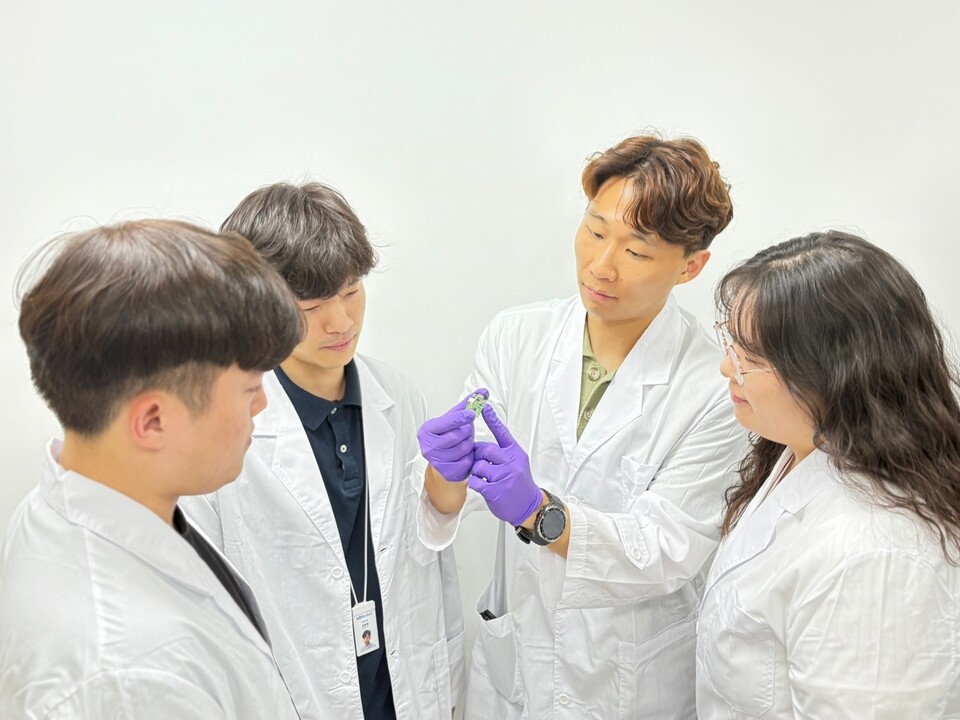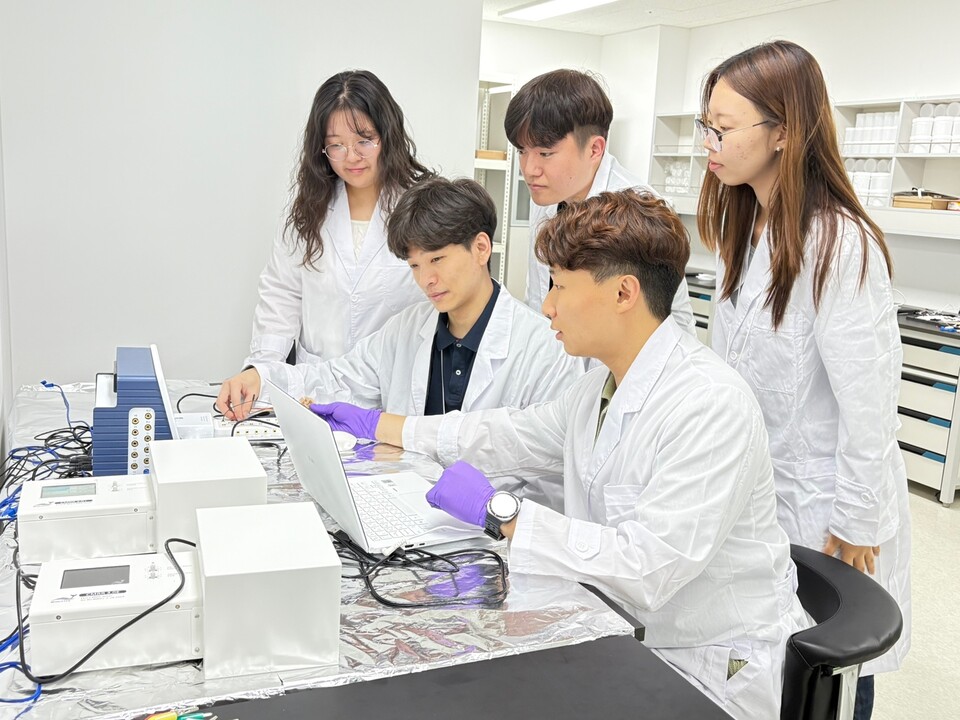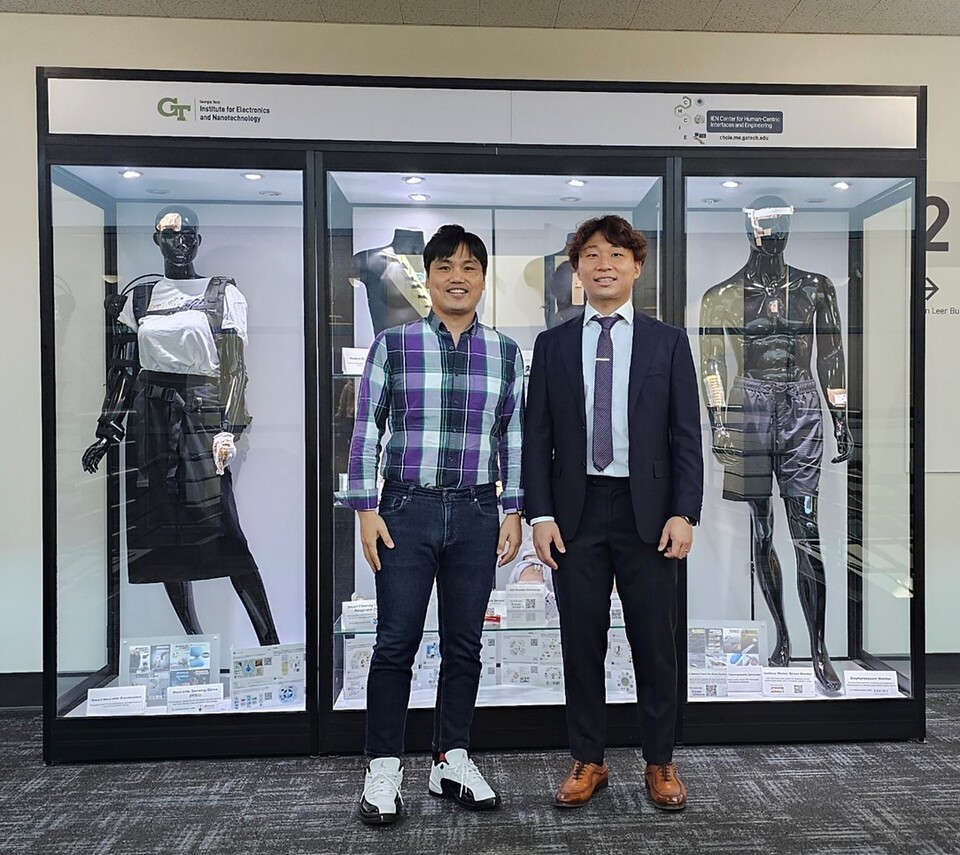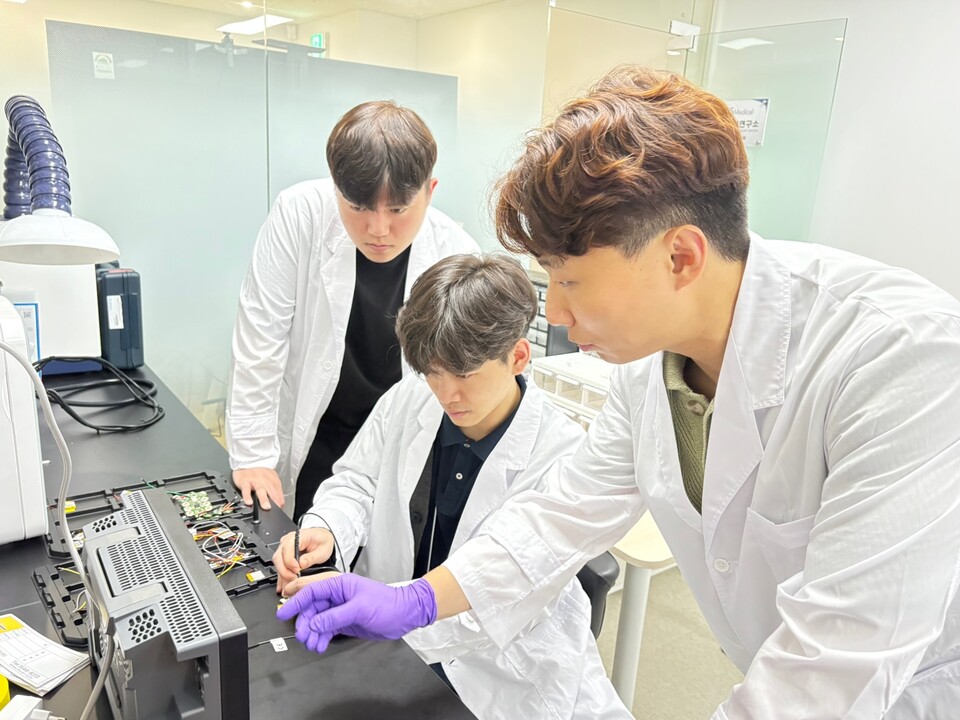
Resource
News
If you leave a question, we will respond quickly and kindly.

CEO Sung Hoon Lee and the research team are discussing while looking at WisMedical's home sleep diagnostic device TedreamTM
(from left: Senior Researcher Seung-yong Hong, Manager Jun-young Kim, CEO Sung Hoon Lee, and Researcher Sujin Lee). / Courtesy of WisMedical
[Hans Economy = Reporter Nara Lee] Sleep apnea, in which breathing repeatedly stops during sleep, is a disease known to be suffered by approximately 1 billion people around the world. When looking at the brain waves of patients with sleep apnea, you can often see that the brain waves appear in a straight line, like a dead person. This is related to the phenomenon of breathing stopping during sleep, and is a phenomenon that occurs when brain activity is abnormally reduced.
Sleep apnea is a disease that can cause high blood pressure, arrhythmia, dementia, stroke, and myocardial infarction, and can even lead to death. It is too dangerous to simply dismiss it as 'snoring'. The representative diagnostic method for this sleep disorder is 'polysomnography (PSG)'. However, this method has a very low actual test compliance rate due to the complexity of the test equipment, high cost, and the time burden of having to be hospitalized for 1 night and 2 days.
In fact, it is known that less than 10% of high-risk patients with sleep apnea in Korea receive formal examinations. Accordingly, attempts are being made to diagnose sleep apnea using various devices based on wearable technology.
However, to achieve this, it is necessary to simultaneously measure and interpret complex biosignals that occur during sleep, such as electroencephalography (EEG), electrooculogram (EOG), electrocardiogram (ECG), electromyogram (EMG), oxygen saturation (SpO2), and body position changes, in order to make an accurate diagnosis. Therefore, it is difficult to completely replace polysomnography (PSG). To overcome these limitations, the 'soft wearable at-home sleep diagnosis technology' has emerged.
WisMedical, a digital healthcare innovation startup, has developed a new concept soft wearable device to enable PSG-level bio-signal measurement, previously only available in hospitals, in everyday life. This technology collects multiple bio-signals during sleep, such as brain waves, electrocardiograms, respiration, and body positions, in real time through a soft wearable patch attached to the forehead, chest, and arms, and analyzes them with an AI-based algorithm to automatically diagnose sleep stages and sleep apnea index (AHI).

The WisMedical research team is conducting a biosignal measurement and analysis experiment using the TedreamTM at-home sleep diagnosis device. / Provided by WisMedical
This device, named 'Tedream™', is gaining attention as an alternative to existing PSGs. In particular, the soft electronics technology that flexibly adheres to the skin minimizes noise caused by the user's movements, and the wireless structure without wires and the thin and light patch form do not disturb the user's sleep.
WisMedical has currently completed a clinical trial with Emory University Hospital and researchers and is pursuing GMP certification procedures and licensing for the technology. In addition, through this study, it was confirmed that the accuracy of sleep stage classification and apnea/hypopnea index (AHI) estimation using a soft wearable patch was over 90% compared to PSG.
These results were published in a sister journal of Science, providing academic support for technical feasibility and real-world data, and WisMedical is pursuing full-scale clinical trials and verification in cooperation with domestic and international medical institutions based on this. This technology can be expanded beyond simple diagnostic assistance to an early prediction model for chronic diseases such as cardiovascular risk or nervous system disorders based on biosignals during sleep. It can also be applied to nursing homes for the elderly, outpatient sleep clinics, and non-face-to-face health management models for chronic patients.

In front of the research center of Professor Woon-hong Yeo of Georgia Tech and the research site that became the starting point of WisMedical technology, the co-founders
(from left, Co-CEO Woon-Hong Yeo and CEO Sung Hoon Lee) sat together. / Courtesy of WisMedical
WisMedical is a global tech-based startup founded by CEO Sung Hoon Lee, who invented the product while pursuing his doctorate at the Georgia Institute of Technology, and Professor Woon-Hong Yeo, an authority in the field and CTO of Georgia Tech. Since its inception, WisMedical has been pushing to enter the U.S. market as well as Korea based on its clinical network in the U.S.
Currently, it is preparing for the US FDA 510(k) approval of the Home Sleep Testing Device, and recently, have been expanding its contact points with global partners through product demonstrations and technology announcements at Smart Tech Korea (STK), MEMS&Sensors Technical Congress (MSTC), Korea International Medical&Hospital Equipment Show (KIMES), and Consumer Electronics Show (CES).
In addition, it was selected for the Digital Healthcare Open Innovation Challenge co-hosted by Draper-Seoul Biohub and won the Digital Innovation Award hosted by Hankook Ilbo. In addition, WisMedical is expanding its technology commercialization and export base by participating in TIPS R&D and global expansion related industries, as well as government-supported projects hosted by the Ministry of Science and ICT and Yongin City.
According to the Korea Sleep Industry Association, the domestic sleep market, which was about 480 billion won in 2011, has grown to about 3 trillion won in 2021, and the global sleep disorder market is also expected to record an average annual growth of more than 10% over the next 10 years, reaching 27.6 billion dollars in 2024. This means that the need for and demand for out-of-hospital sleep diagnosis solutions are continuously expanding.

WisMedical researchers checking the circuit design and signal algorithm of TedreamTM (from left: Senior Seung-yong Hong, Manager Jun-young Kim, and CEO Sung Hoon Lee)
Accordingly, WisMedical plans to build a digital healthcare platform that goes beyond sleep apnea diagnosis and enables continuous diagnosis and AI prediction based on soft wearables. Good examples include algorithms that predict secondary diagnosis and deterioration of lung disease based on breathing patterns during sleep, or early detection of cardiovascular diseases such as arrhythmia through abnormal electrocardiograms during sleep.
“The essence of digital healthcare is moving the focus of diagnosis from hospitals to everyday life,” said Sung Hoon Lee, CEO of WisMedical. “In line with our company’s vision of Innovation Technology for Better Human Conditions, we aim to improve users’ quality of life by reading the human body’s systems and detecting them early through soft wearable technology.”
The wearable-based sleep diagnosis market is still in its early stages, but explosive growth is expected in the future due to changes in insurance systems and technological advancements. WisMedical aims to become a new standard in the global digital healthcare market through technological innovation that rewrites the concept of medical devices at the center of this trend.
Posted 2025.06.23 06:55
Reporter Lee Nara
2country@sporbiz.co.kr
Source: Hans Economy https://www.hansbiz.co.kr/news/articleView.html?idxno=756365


